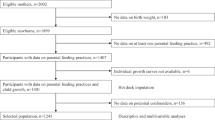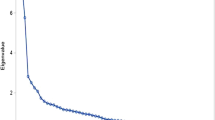Abstract
Objective:
To determine whether controlling parental feeding practices are associated with children's adiposity and test the hypothesis that any associations are mediated by maternal perception of their child's weight.
Method:
Children aged 7–9 years (n=405) were weighed and measured at school as part of the Physical Exercise and Appetite in CHildren Study (PEACHES). Adiposity was indexed with body mass index s.d. scores. The Child Feeding Questionnaire was completed by 53% of mothers of participating children (n=213). Mothers reported whether they thought their child was overweight, normal weight or underweight, and rated their concern about future overweight on a 5-point scale.
Results:
Higher child adiposity was associated with lower ‘pressure to eat’ and higher ‘restriction’ scores. Restriction increased linearly with maternal concern about overweight, and maternal concern about overweight fully mediated the association between child adiposity and restriction. Use of pressure increased as mothers perceived their child to be thinner, but perceived weight did not mediate the association between child weight status and maternal pressure to eat. Monitoring was not associated with child adiposity, maternal perception of weight or concern about overweight.
Conclusion:
Restriction appears to be a consequence of mothers' concern about their child becoming overweight rather than a cause of children's weight gain. Pressure may be a more complex response that is influenced by the desire to encourage consumption of healthy foods as well as ensure adequate energy intake and appropriate weight gain.
This is a preview of subscription content, access via your institution
Access options
Subscribe to this journal
Receive 12 print issues and online access
$259.00 per year
only $21.58 per issue
Buy this article
- Purchase on Springer Link
- Instant access to full article PDF
Prices may be subject to local taxes which are calculated during checkout

Similar content being viewed by others
References
Baron RM, Kenny DA (1986). The moderator-mediator variable distinction in social psychological research: conceptual, strategic, and statistical considerations. J Pers Soc Psychol 51, 1173–1182.
Baughcum AES, Powers W, Johnson B, Chamberlin LA, Deeks CM, Jain A et al. (2001). Maternal feeding practices and beliefs and their relationships to overweight in early childhood. J Dev Behav Pediatr 22, 391–408.
Birch LL, Fisher JO, Davison KK (2003). Learning to overeat: maternal use of restrictive feeding practices promotes girls’ eating in the absence of hunger. Am J Clin Nutr 78, 215–220.
Birch LL, Fisher JO, Grimm-Thomas K, Markey CN, Sawyer R, Johnson SL (2001). Confirmatory factor analysis of the Child Feeding Questionnaire: a measure of parental attitudes, beliefs and practices about child feeding and obesity proneness. Appetite 36, 201–210.
Birch LL, Fisher JO (1998). Development of eating behaviors among children and adolescents. Pediatrics 101, 539–549.
Blissett J, Meyer C, Haycraft E (2006). Maternal and paternal controlling feeding practices with male and female children. Appetite 47, 212–219.
Campbell MW, Williams CJ, Hampton A, Wake M (2006). Maternal concern and perceptions of overweight in Australian preschool-aged children. Med J Aust 184, 274–277.
Carnell S, Edwards C, Croker H, Boniface D, Wardle J (2005). Parental perceptions of overweight in 3–5 y olds. Int J Obes 29, 353–355.
Carnell S, Wardle J (2007). Associations between multiple measures of parental feeding and children's adiposity in United Kingdom preschoolers. Obesity 15, 137.
Clark HR, Goyder E, Bissell P, Blank L, Peters J (2007). How do parents’ child-feeding behaviours influence child weight? Implications for childhood obesity policy. J Public Health 29, 132–141.
Cole TJ, Bellizzi MC, Flegal KM, Dietz WH (2000). Establishing a standard definition for child overweight and obesity worldwide: International survey. Br Med J 320, 1240–1243.
Cole TJ, Flegal K, Nicholls D, Jackson AA (2007). Body mass index cut offs to define thinness in children and adolescents: international survey. Br Med J 335, 194–202.
Cole TJ, Freeman JV, Preece MA (1995). Body-Mass Index Reference Curves for the UK, 1990. Arch Dis Child 73, 25–29.
Costanzo PR, Woody EZ (1985). Domain-specific parenting styles and their impact on the child's development of particular deviance: the example of obesity proneness. J Soc Clin Psychol 3, 425.
Drucker RR, Hammer LD, Agras WS, Bryson S (1999). Can mothers influence their child's eating behavior? J Dev Behav Pediatr 20, 88–92.
Etelson DD, Brand A, Patrick DA, Shirali A (2003). Childhood obesity: do parents recognize this health risk? Obes Res 11, 1362–1368.
Faith MS, Scanlon KS, Birch LL, Francis LA, Sherry B (2004). Parent-child feeding strategies and their relationships to child eating and weight status. Obesity 12, 1711–1722.
Farrow CV, Blissett J (2008). Controlling feeding practices: cause or consequence of early child weight? Pediatrics 121, 164–169.
Fisher JO, Birch L (1999a). Restricting access to palatable foods affects children's behavioral response, food selection, and intake. Am J Clin Nutr 69, 1264–1272.
Fisher JO, Birch LL (1999b). Restricting access to foods and children's eating. Appetite 32, 405–419.
Fisher JO, Mitchell DC, Smiciklas-Wright H, Birch LL (2002). Parental influences on young girls’ fruit and vegetable, micronutrient, and fat intakes. J Am Diet Assoc 102, 58–64.
Francis LA, Hofer SM, Birch LL (2001). Predictors of maternal child-feeding style: maternal and child characteristics. Appetite 37, 231–243.
Gray VB, Byrd SH, Cossman JS, Chromiak JA, Cheek W, Jackson G (2007). Parental attitudes toward child nutrition and weight have a limited relationship with child's weight status. Nutr Res 27, 548–558.
Grimmett C, Croker H, Carnell S, Wardle J (2008). Telling parents their child's weight status: psychological impact of a weight-screening program. Pediatrics 23, 144–151.
Iannotti RJ, Obrien RW, Spillman DM (1994). Parental and peer influences on food-consumption of preschool African-American children. Percept Mot Skills 2, 747–752.
Johnson SL, Birch LL (1994). Parents and children's adiposity and eating style. Pediatrics 94, 653–661.
Keller KL, Pietrobelli A, Johnson SL, Faith MS (2006). Maternal restriction of children's eating and encouragements to eat as the ‘non-shared environment’: a pilot study using the Child Feeding Questionnaire. Int J Obes 30, 1670–1675.
Lee Y, Mitchell DC, Smiciklas-Wright H, Birch LL (2001). Diet quality, nutrient intake, weight status, and feeding environments of girls meeting or exceeding recommendations for total dietary fat of the American Academy of Pediatrics. Pediatrics 54, 179–186.
Matheson DM, Robinson TN, Varady A, Killen JD (2006). Do Mexican-American mothers’ food-related parenting practices influence their children's weight and dietary intake? J Am Diet Assoc 106, 1861–1865.
May AL, Donohue M, Scanlon KS, Sherry B, Dalenius K, Faulkner P et al. (2007). Child-feeding strategies are associated with maternal concern about children becoming overweight, but not children's weight status. J Am Diet Assoc 107, 1167–1174.
Moens E, Braet C (2007). Predictors of disinhibited eating in children with and without overweight. Behav Res Ther 45, 1357–1368.
Montgomery C, Jackson K, Kelly L, Reilly J. (2006). Parental feeding style, energy intake and weight status in young Scottish children. Br J Nutr 96, 1149–1153.
Orrell-Valente JK, Hill LG, Brechwald WA, Dodge KA, Pettit GS, Bates JE (2007). ‘Just three more bites’: an observational analysis of parents’ socialization of children's eating at mealtime. Appetite 48, 37–45.
Powers SW, Chamberlin LA, van Schaick KB, Sherman SN, Whitaker RC (2006). Maternal feeding strategies, child eating behaviors, and child BMI in low-income African-American preschoolers. Obesity 14, 2026–2033.
Preacher KJ, Hayes AF (2004). SPSS and SAS procedures for estimating indirect effects in simple mediation models. Behav Res Methods Instrum Comput 36, 717–731.
Sobel ME (1982). Asymptotic intervals for indirect effects in structural equations models. In: S Leinhart (ed.), Sociological Methodology. Jossey-Bass: San Francisco. pp 290–312.
Spruijt-Metz D, Lindquist CH, Birch LL, Fisher JO, Goran MI (2002). Relation between mothers’ child-feeding practices and children's adiposity. Am J Clin Nutr 75, 581–586.
Spruijt-Metz D, Li C, Cohen E, Birch L, Goran M (2006). Longitudinal influence of mother's child-feeding practices on adiposity in children. J Pediatr 148, 314–320.
Tabachnick B, Fidell L (1996). Using multivariate statistics. Harper Collins College Publishers: New York, NY, USA.
Acknowledgements
PEACHES was supported by Cancer Research UK (Grant code C1418/A6124).
Author information
Authors and Affiliations
Corresponding author
Rights and permissions
About this article
Cite this article
Webber, L., Hill, C., Cooke, L. et al. Associations between child weight and maternal feeding styles are mediated by maternal perceptions and concerns. Eur J Clin Nutr 64, 259–265 (2010). https://doi.org/10.1038/ejcn.2009.146
Received:
Revised:
Accepted:
Published:
Issue Date:
DOI: https://doi.org/10.1038/ejcn.2009.146
Keywords
This article is cited by
-
How Do Parental Feeding Knowledge and Practices Affect Chinese Children’s Weight Status? Findings from Multiple Waves of CHNS
Journal of Child and Family Studies (2023)
-
Bidirectional associations between parental feeding practices, infant appetitive traits and infant BMIz: a longitudinal cohort study
International Journal of Behavioral Nutrition and Physical Activity (2022)
-
Does your past define you? How weight histories are associated with child eating-disorder psychopathology
Eating and Weight Disorders - Studies on Anorexia, Bulimia and Obesity (2022)
-
Parental Perception of Body Weight Status of Their 8-year-old Children: Findings from the European CHOP Study
Maternal and Child Health Journal (2022)
-
Grazing in children: associations with child’s characteristics and parental feeding practices
Eating and Weight Disorders - Studies on Anorexia, Bulimia and Obesity (2021)



